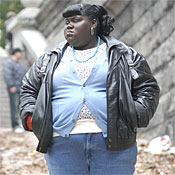- REVIEW
- READER REVIEWS
Precious: Based on the Novel Push by Sapphire
|
(No longer in theaters)
|
|
Genre
Drama
Producer
Lee Daniels, Sarah Siegel-Magness, Gary Magness
Distributor
Lionsgate Films
Release Date
Nov 6, 2009
Release Notes
Limited
Official Website
Review
There are worst-case scenarios, and then there is Precious, who’s in a hellish league of her own. The heroine and narrator of the novel Push by Sapphire (born Ramona Lofton), now a much-hyped film called Precious: Based on the Novel Push by Sapphire, is the embodiment of everything�I mean, everything�American society values least and victimizes most. She’s a poor, illiterate, morbidly obese, dark-skinned African-American girl. She was raped by her father from the age of 3, pregnant with his child at 12 (the baby, which she names Mongo, has severe Down syndrome), and then pregnant by him again at 16, when the novel begins. She’s also sexually molested by her jealous, welfare-cheating, gross, and sedentary mother, although the genital fingering might seem preferable to the verbal and physical abuse. The book gives you quite a bludgeoning. I started to pull back from it in a flashback when the 12-year-old girl is in labor on the kitchen floor and her mother is kicking her in the face.
Sapphire goes on to chart Precious’s journey from darkness to light: her transfer to an alternative school and acceptance into a warm, matriarchal community, where she’s encouraged to give voice to her experiences in poetry and prose. A former teacher, Sapphire wants to show young women that if the damaged, emotionally locked-up Precious can develop a sense of self-worth and autonomy, anyone can. But Push, written in Precious’s distinctive patois (�I still don’t say nuffin’. This hoe is keeping me from maff class. I like maff class�), is so schematic, so single-minded in its depiction of predatory evil and empowering good that you may think its title is not an exhortation to drive through pain but a description of the author’s technique.
I dwell on the novel because the movie leads with it (that subtitle!) and because it faithfully, even reverently, sticks to Sapphire’s outline. But the director, Lee Daniels, working from a screenplay by Geoffrey Fletcher, has a good sense of when to push and when to lie back. His rhythms are punchy�abrasive without being assaultive. And he has such a striking actress in Gabourey Sidibe, who plays Precious, that he doesn’t need to force her alienation�or ours. I’m not judging girls who look like Sidibe in life, but her image onscreen is jarring to the point of being transgressive, its only equivalent to be seen in John Waters’s pointedly outrageous carnivals. Her head is a balloon on the body of a zeppelin, her cheeks so inflated they squash her eyes into slits. Her expression is either surly or unreadable. Even with her voice-over narration, you’re meant to stare at her ebony face and see nothing. The movie is saying that she’s not an object, but the way that Sidibe is directed she becomes one. It’s only in a couple of heavy-handed fantasy sequences (she emerges from a theater in a bright-red gown to popping flashbulbs) that her eyes are windows to the soul.
Daniels does everything to hold the melodrama at bay, but there’s only so much he can do. The comedian Mo’Nique gives a vivid and surprisingly varied performance as Precious’s mother, Mary (ironic-name alert): I have no doubt she found psychological justifications for Mary’s sadism, for the displacement onto Precious of her fury at a man who she thinks preferred her daughter to her. But the woman who drops a TV onto Precious as she hurries down the stairs with her infant is a sociopath, too singularly garish to be universal. As Precious’s teacher, Ms. Rain, Paula Patton is at the other extreme. A light-skinned beauty with fine features, she has a network-TV wholesomeness: Even her lesbianism has the equivalent of a Good Housekeeping Seal of Approval�a poster on her wall of For Colored Girls Who Have Considered Suicide When the Rainbow Is Enuf. The most offbeat touch is a social worker played by Mariah Carey. She’s a tad too goody-goody, but her toasty, caressing voice is a gift beside Sidibe’s mush-mouthed monosyllables.
Daniels does well with the girls in Precious’s class, who have a mordant, barbed rapport. They’re almost as defended as she is, so when they bond with her it’s not sticky: You can feel their relief in being able to get out of their own heads and be kind. That’s when the film is genuinely moving without being manipulative. But it somehow skips over the part where Precious actually learns. When she tells us, in voice-over, that she won a literacy prize, you may think you missed something. Precious jumps from signpost to signpost. Set in 1987, it features obligatory images on TV of Reagan and Ollie North�but also, for hope’s sake, photos of Oprah Winfrey (thinner than she was at the time), who signed onto the film as co-executive-producer after it was made. The elements of Precious are powerful and shocking, but the movie is programmed. It is its own study guide.
Related Stories
New York Magazine Reviews
- David Edelstein's Full Review (11/9/09)
